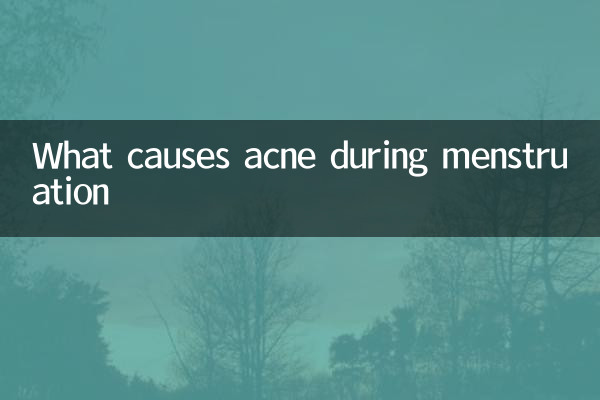What causes acne during menstruation
Many women will suddenly have acne before and after menstruation, which not only affects appearance, but may also bring psychological stress. So, what are the causes of acne during menstruation? This article will combine popular topics and hot content in the past 10 days to analyze them in detail from multiple angles such as hormone changes, skin care, and diet.
1. Hormone changes are the main reasons

Menstrual acne is closely related to changes in hormone levels in the body. Here are the effects of hormone changes on the skin:
| Hormone type | Changes in premenstrual levels | Effects on the skin |
|---|---|---|
| Estrogen | decline | Skin barrier function is weakened and water locking ability is reduced |
| Progesterone | rise | Stimulate sebaceous glands to secrete more oil |
| Androgen | Relatively increased | Further aggravate sebum secretion, resulting in blocked pores |
As can be seen from the table, premenstrual estrogen levels decline, while progesterone and androgens are relatively increased. This hormone fluctuation will stimulate the sebaceous glands to secrete more oil, causing blocked pores, which will cause acne.
2. Other influencing factors
In addition to hormone changes, the following factors can also aggravate menstrual acne:
| factor | Influence mechanism | Preventive advice |
|---|---|---|
| pressure | Increase cortisol secretion and stimulate sebaceous glands | Practice meditation, take deep breath |
| diet | High-sugar and high-fat foods promote inflammatory response | Increase vegetables and fruit intake |
| Deficient sleep | Impact skin repair function | Guaranteed to sleep 7-8 hours |
| Improper skin care | Over-cleaning damages skin barriers | Choose mild cleansing products |
3. How to prevent and improve menstrual acne
1.Adjust skin care plan: Start using salicylic acid or fruit acid products one week before menstruation to help clear pores.
2.Pay attention to diet: Reduce intake of dairy, high sugar and high GI foods that may aggravate the inflammatory response.
3.Manage stress: Practice relaxation techniques such as yoga and meditation to reduce the impact of stress hormones on the skin.
4.Ensure sleep: Adequate sleep helps skin repair and hormone balance.
5.Moderate exercise: Promote blood circulation and help excrete toxins in the body.
4. Under what circumstances do you need to seek medical treatment?
If menstrual acne is accompanied by the following conditions, it is recommended to seek medical treatment in time:
| symptom | Possible Causes | Recommended medical department |
|---|---|---|
| Severe acne and continues to heal | Polycystic ovary syndrome | Gynecology/endocrine department |
| With irregular menstruation | Hormonal disorder | Gynecology |
| Leave obvious scars | Severe inflammatory reaction | dermatology |
5. Latest research progress
According to a recent study published in the Journal of Dermatology, probiotics may help improve menstrual acne. Researchers have found that supplementing with specific probiotics can regulate intestinal flora, which in turn affects skin health. However, more research is needed to confirm this area.
Another study found that topical use of nicotinamide-containing skin care products can effectively reduce the incidence of menstrual acne, which may be related to the anti-inflammatory and regulating sebum secretion effects of nicotinamide.
Summarize: Acne during menstruation is mainly related to hormone fluctuations, but stress, diet, sleep and other factors will also aggravate this phenomenon. By adjusting lifestyle and skin care habits, most women can significantly improve their menstrual acne problems. If the symptoms are serious or other abnormalities, it is recommended to seek medical examination in time.

check the details

check the details